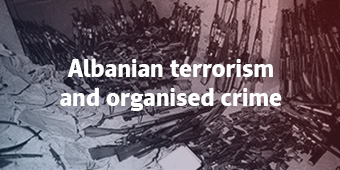
Kosovo-Metohija province

Kosovo-Metohija is an autonomous province within the Republic of Serbia and on the basis of the United Nations Security Council Resolution 1244 which was adopted on June 10, 1999, it is under the interim civil and military administration of the UN.
The UN Security Council approved at a session held on October 24, 2005 in New York the beginning of negotiations on the future status of Kosovo-Metohija.
The negotiations began with the talks on decentralisation, which were held on February 20 and 21 in Vienna.
Members of Serbian parliament adopted on November 21, 2005 the Resolution of the Serbian parliament on the mandate for political talks on the future status of Kosovo-Metohija, which was proposed to the parliament by the Serbian government.
Serbian parliament and all state organs expressed in the Resolution the full readiness to assume their part of responsibility in the process of political resolution of the issue of Kosovo-Metohija, on the basis of international law and in line with democratic values of the modern world. In line with the widest principle of the United Nations on the inviolability of sovereignty and territorial integrity of democratic states, Serbian parliament defined with this resolution the framework and mandate for political talks on the future status of Kosovo-Metohija.
The former state union of Serbia-Montenegro, today the Republic of Serbia, was an internationally recognised state and as such, it was a member of the UN and other international organisations. All principles and norms of those international organisations apply to the Republic of Serbia, as well as to all other states, and especially those principles and norms that establish the sovereignty and territorial integrity of the member states. These are first of all the Charter of the United Nations and the Final Act of the Conference on European Security and Cooperation (today OSCE) from Helsinki from 1975.
In addition to these and other binding normative documents of international law, the sovereignty and territorial integrity of the former Serbia-Montenegro (the Federal Republic of Yugoslavia at that time) is explicitly confirmed by the UN SC Resolution 1244, as well as in other SC resolutions, namely 1160, 1199, 1203 (all from 1998) and 1239 from 1999. In addition to basic sources of international law, borders and territorial integrity of the states that were created through the violent break-up of the former Yugoslavia are additionally guaranteed by special international legal documents and agreements, such as the Opinions of the Arbitration Committee of the Conference on Yugoslavia (Opinion no. 3 from January 11, 1992) and the General Framework Agreement for Peace in Bosnia-Herzegovina from November 21, 1995 (Dayton/Paris Peace Accords).
Serbian parliament has expressed the firm conviction that the UN Security Council is a reliable guarantor of respecting international law and the overall international order based on peace, and respect of freedom as the highest political values and human rights as measure of that freedom. Because of that it is expected of the Security Council that with the power of its authority it will ensure that there will be no exceptions made in Serbia’s case when it comes to the indisputable principle of respecting sovereignty and territorial integrity.
Serbian parliament expresses the collective conviction that it shares the stand of the entire international community that it is unacceptable that the internationally recognised borders of a democratic state are changed against its will. Any attempt at imposing a solution which aims at practically legalizing the division of the Republic of Serbia by seizure of a part of its territory would present not just legal violence against a democratic country, but also violence against international law itself. There is no doubt that it would be an unheard of case in international law and the practice of world organisations, and also a dangerous precedent with unforeseeable long-term consequences for international order in general. Considering the given legal reasons, the Serbian parliament would declare any imposed solution for the future status of Kosovo-Metohija illegitimate, against the law and invalid. The future status of Kosovo-Metohija can be defined only in the frameworks of suitable principles and norms of the UN and other international organisations, while respecting the constitutional order of the Republic of Serbia.
The Serbian parliament, within these most general frameworks, without reserve is in favour of a compromise solution and expresses full readiness that the future status of Kosovo-Metohija is secured according to a European solution, which is in complete accordance with the principles of sovereignty and territorial integrity of Serbia as a recognised and equal subject of international law. The form and content of that solution should satisfy the state interests of the Republic of Serbia, as well as the interests of ethnic-Albanians in Kosovo-Metohija, Serbs in the province and all other groups in Kosovo-Metohija. Such an inclusive aim is imaginable only in agreement and a compromise solution for the future status of Kosovo-Metohija. In that sense, full political will is being directed towards finding concrete and realisable forms of a stable and lasting solution for Kosovo-Metohija, in which the legitimate interests of ethnic-Albanians in the province must be taken fully into account. The future status of Kosovo-Metohija must provide respect of human rights of members of national communities regardless of whether they make up a majority or minority of the population in the province, and must especially provide the right to safe living conditions and personal and property security, just and efficient judiciary, undisturbed property rights, free expression of political, religious, cultural and other personal beliefs, right to return and execution of public functions, as well as all other rights listed in charters of the Council of Europe that the Republic of Serbia signed and ratified. All these rights are an integral part of the standards that Kosovo-Metohija should fulfill simultaneously with the talks on its future status, which is at the same time the position of the UN Security Council based on the report of its special envoy, Kai Eide. Kosovo-Metohija spans 10,849 square kilometres of the territory in the south-west of Serbia, with Pristina as its administrative, economic and cultural seat.
Territorial organization
Kosovo-Metohija consists of 29 municipalities and five districts, with seats in Pristina, Pec, Prizren, Kosovska Mitrovica and Gnjilane. Kosovo-Metohija is separated from neighbouring Albania by the mountain massif of Prokletije and is separated from Macedonia by Sar Planina mountain with two highest mountain peaks in Serbia: Djeravica and Crni Vrh. The province is made up of two regions which differ from each other in the soil content and climate and are divided by Cicavica and Crnoljevo mountains. The characteristic of the province is rapid economic and cultural development, high population density and demographic variety with a pronounced domination of Albanian population.
Relief
This Serbian southern province has a varied relief: it is edged with mountainous wreaths which are intersected by canyons and very wide valleys of the rivers Binacka Morava, Lab and Beli Drim. Kosovo is placed in the south-eastern and eastern part of the province, near the Morava-Vardar valley. It is primarily hilly land so that wealth in ores is the main natural potential of this region. On the other hand, Metohija is placed in the west and north-west of the province and consists of fertile arable land. The geographic division between Metohija-Kosovo caused the difference of their flora and fauna. Metohija has the characteristic influence of the Mediterranean thus being the region with the highest number of Mediterranean species of flora and fauna in the whole Serbia, while Kosovo does not differ from the rest of Serbia.
Traffic importance
Kosovo-Metohija is located at the watershed of rivers which belong to Black Sea, Adriatic or Aegean basins that make this province an important traffic route. Its Eastern edge touches the Morava-Vardar direction where one branch of the highway goes, while another important Serbian traffic route, the Ibar highway, passes through the North-Western part of the province. There is a plan for the construction of a new highway which would take the western route from Nis through Kosovo, Metohija and Montenegro to the Adriatic coast.
Population
According to the 1991 census, Kosovo-Metohija has 1,956,196 inhabitants which is slightly less than 20% of the total population of Serbia. There are many nationalities with pronounced domination of Albanians - 1,596,072 or 82.2% of the population of the province, or 17% of the total population of Serbia. Then come the Serbs - 194,190, Muslims - 66,189, Romanies - 45,745, Montenegrins - 20,356, Turks - 10,446, Croats - 8,062 and other smaller national and ethnic groups consisting of 24 in all.

















